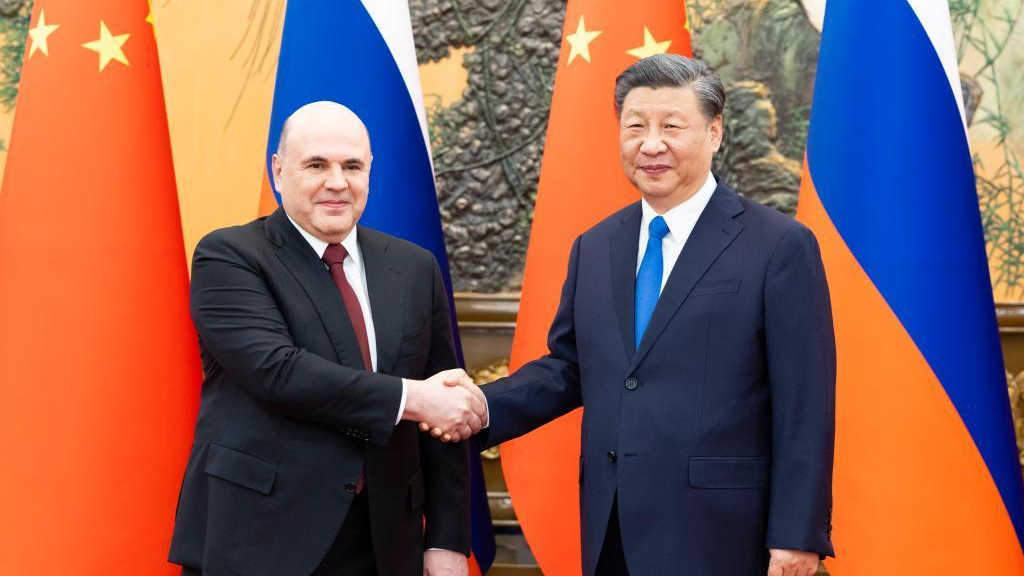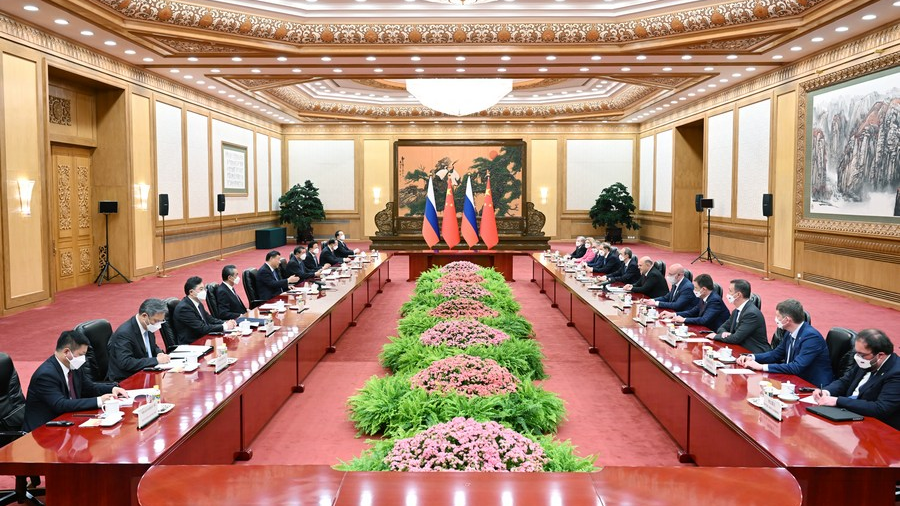
Chinese President Xi Jinping meets with Prime Minister of the Russian Federation Mikhail Mishustin at the Great Hall of the People in Beijing, capital of China, May 24, 2023. /Xinhua
Chinese President Xi Jinping meets with Prime Minister of the Russian Federation Mikhail Mishustin at the Great Hall of the People in Beijing, capital of China, May 24, 2023. /Xinhua
Editor's note: Hamzah Rifaat Hussain, a special commentator on current affairs for CGTN, is a host for ThinkTech Hawaii. The article reflects the author's opinions and not necessarily the views of CGTN.
In a meeting with Russian Prime Minister Mikhail Mishustin in Beijing on May 24, President Xi Jinping relayed China's firm commitment towards supporting Moscow's core interests and strengthening existing avenues of cooperation between the two sides to further solidify the bilateral relationship. Both the understandings reached and the agreements signed demonstrated China and Russia's resolve to focus on trade, completion of projects and promotion of economic prosperity in the absence of aggression and hostility. Both sides sought to elevate their existing apolitical cooperation and strategic partnerships to new heights in the absence of Western pressure, nefarious designs and bloc politics.
As Chinese President Xi Jinping said at the opening ceremony of the plenary session of the second Eurasian Economic Forum of the Eurasian Economic Union via video link on May 24, the historical trend toward multipolarity and economic globalization is irresistible, adding that it is the broad consensus of the international community to uphold genuine multilateralism and promote coordinated development across regions.
China-Russia cooperation is a great example of that. Since the Ukraine conflict began, Prime Minister Mishustin is the first high ranking official from the Kremlin to visit Beijing. His candid meetings with both Chinese President Xi Jinping and Premier Li Qiang resulted in joint expressions of goodwill as well as a desire to eschew bloc politics which are counterproductive for world peace. Both sides stood against the callousness that was recently witnessed from blocs such as the G7, which issued scathing declarations that smeared both China and Russia's "lack of transparency" on nuclear arsenals. During talks with Premier Li, Prime Minister Mishustin stated that Russia desires to jointly address global challenges with China in order to navigate turbulence in the international arena which punctures flawed Western assessments on both countries. This includes maintaining the positive trajectory of bilateral trade, upholding the essence of multilateralism and calling out unipolarity in the international system.

Chinese President Xi Jinping meets with Prime Minister of the Russian Federation Mikhail Mishustin at the Great Hall of the People in Beijing, capital of China, May 24, 2023. /Xinhua
Chinese President Xi Jinping meets with Prime Minister of the Russian Federation Mikhail Mishustin at the Great Hall of the People in Beijing, capital of China, May 24, 2023. /Xinhua
Despite volatility in the international environment and increased protectionism, the bilateral trade between China and Russia stood at $73.15 billion in the first four months of 2023. According to Mishustin, bilateral trade has the potential to reach $200 billion in 2023 which will be up from the previous figure of $190 billion in 2022. The year 2022 also witnessed China becoming Russia's largest energy consumer, while since February in the same year, Russia surpassed Saudi Arabia to become China's largest crude oil supplier.
Enhanced trading ties and a joint endeavor to expand the scope of trading ties coincides with a desire for conflict resolution and peace. China's unwavering adherence to neutrality on the Ukraine conflict for example is a case in point. Beijing has repeatedly stated that the conflict can only be resolved if talks are brokered, aggression is shelved and dialogue is initiated. What is often missing from Western fallacies regarding China's historic relations with Russia however, is that peace remains a cornerstone of foreign policy.
Note further, that the Special Representative of the Chinese Government on Eurasian Affairs Li Hui met Ukrainian President Volodymyr Zelenskyy in Kyiv, Ukraine, which followed a call from President Xi to his Ukrainian counterpart, which the latter described as "long and meaningful." This combination of enhancing economic cooperation and soft power between Russia and China stands in stark contrast to provocative maneuvers from alliances such as NATO. Plans by the alliance to open a liaison office in Japan, which is an example of expansionist designs being pursued in the Asia Pacific, was rightly censured by the Chinese Foreign Ministry.
The focus, as expressed by the leaderships of both sides remains on exploring and tapping into avenues such as energy cooperation. Mishustin's visit to Beijing coincided with being accompanied by top officials such as Russian Deputy Prime Minister Alexander Novak who deals with energy policy. Alongside energy cooperation, both sides spoke of upholding the essence of multilateralism and multipolarity by strengthening cooperation in the United Nations as permanent members of the Security Council, the Shanghai Cooperation Organization and the G20. This joint resolve on upholding multilateralism is important as the international order continues to be threatened by unilateralism, aggression and perpetuation of conflicts.
Hence, the historic meeting by Russian Prime Minister Mishustin once again confirmed Russia and China's joint affirmation to elevate apolitical cooperation and their existing strategic partnership to new heights in the absence of geopolitical power play.
(If you want to contribute and have specific expertise, please contact us at opinions@cgtn.com. Follow @thouse_opinions on Twitter to discover the latest commentaries in the CGTN Opinion Section.)